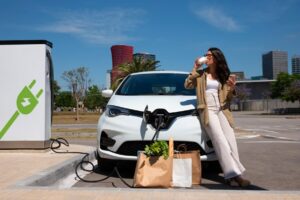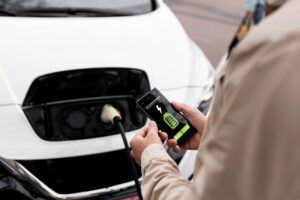
Benefits of Electric Vehicles and Charging Stations
As we all know, electric vehicles offer several benefits over traditional gasoline-powered cars. EVs are environmentally friendly and have lower operating costs than gas-powered cars. EVs provide a smoother, quieter ride and require less maintenance. Charging stations are critical to the growth of the electric vehicle industry. EV charging stations allow drivers to charge their vehicles on the go, making traveling long distances in an EV easier.
History of EV Charging Infrastructure
EV charging infrastructure dates back to the early 1900s when electric cars were first introduced. However, the infrastructure was underdeveloped enough to support the industry’s growth. In the 1990s, the California Air Resources Board (CARB) mandated that automakers produce a certain number of zero-emissions vehicles (ZEVs).
CARB required automakers to establish charging infrastructure to support the growth of ZEVs. However, the infrastructure did not develop as expected, and in 2003, CARB eliminated the mandate. The lack of charging infrastructure was one of the reasons why the EV industry did not take off in the early 2000s.
Overview of Current EV Charging Station Availability
Today, the availability of EV charging stations has increased significantly. According to the US Department of Energy, there are over 100,000 public charging stations in the US. Most of these charging stations are Level 2 (240-volt), which can fully charge an EV in 4-8 hours.
There are also over 3,000 DC fast-charging stations in the US, which can charge an EV to 80% in less than 30 minutes. The availability of charging stations has improved significantly in recent years, making it easier for EV owners to travel long distances.
I am running out!
“Charge Anxiety” is the fear of running out of charge while on the road. Historically, if you run out of gas, you’d walk to the gas station and fill a gas can. You can’t do this on an EV. What’s worse is that because EVs don’t have a transmission, you can’t “Put it in neutral” and tow it. You’ll need a flatbed to pick up your car and bring it to a charging station. In some areas, AAA will offer mobile EV charging.
Mobile EV Charging is accomplished with a mobile charging unit.

These mobile charging units are expected to become a “hot” franchise business.
30kw emergency mobile EV charging system with 30kwh battery costs $21,000
60kw emergency mobile EV charging system with 60kwh battery costs $39000
Please E-mail me at Mark@TheEnergyGrid.com for more information.
Finding EV Charging Stations Near You
Finding EV charging stations near you has never been easier. Several websites and mobile apps provide information on EV charging stations’ location and availability. Some of the popular apps include PlugShare, ChargePoint, and Electrify America.
PlugShare is a popular app that provides information on over 200,000 charging stations worldwide. The app allows users to filter their search by charging station type, payment method, and network. ChargePoint is another popular app that provides information on over 110,000 charging stations in the US.
Electrify America and ChargePoint Charging Stations
Electrify America and ChargePoint are two of the largest charging station networks in the US. Electrify America is a subsidiary of Volkswagen and was established as part of Volkswagen’s settlement with the US government over the diesel emissions scandal.
As of March 2023, Electrify America has 3,479 Fast chargers and 116 Level 2 chargers at 800 Stations, with 112 “Coming Soon.”
ChargePoint is another popular charging station network in the US. ChargePoint has over 100,000 charging stations worldwide and has partnerships with several automakers, including BMW, Daimler, and Tesla.
Generally, EV chargers are universal.
Almost all EVs use the same standard plug for Level 1 and Level 2 charging. The J1772 adapter connects the public SAE J1772 chargers to a Tesla vehicle to enable Tesla drivers to charge at more charging stations.
You’ll typically receive a Level 1 charging cord with the purchase of your EV. It delivers 1.4kW to your vehicle. On average, you’ll get four miles of driving range per hour of charge.
While a Level 1 charging cord delivers 1.4kW, a Level 2 charging system ranges from 6.2 to 7.6kW. An hour of charging with Level 2 will get you an average driving range of 32 miles.
Level 3 requires a CHAdeMO plug, a 10-pin pin typically found in fast-charging stations. They can supply quick charging of up to 50kW. While Level 3 isn’t as standard as Level 2, it’s often the fastest way to get charged independently. Because Level 3 chargers utilize battery information to optimize the charge, not all Level 3 chargers are compatible with all EVs.
Infrastructure Bill: What it Means for EV Charging Stations
The Infrastructure Bill passed by the US Senate in August 2021 includes several provisions to support the growth of the EV industry. The bill has $7.5 billion for EV charging infrastructure, which will fund the installation of 500,000 charging stations across the US. The bill also provides funding for electric buses and trucks, tax incentives for EV purchases, and funding for research and development of EV technology.
The Infrastructure Bill is a significant step towards the electrification of transportation in the US. The funding for EV charging infrastructure will make it easier for EV owners to travel long distances and will support the growth of the EV industry.
Charging is Outpacing Forecasts: A Study on the Growth of EV Charging Infrastructure
A study published by the International Energy Agency (IEA) in May 2021 found that the growth of EV charging infrastructure is outpacing forecasts. The study found over 7 million public and private charging stations worldwide, up from 1 million in 2015.
The study also found that the number of fast-charging stations is increasing rapidly, with over 200,000 fast-charging stations worldwide. The study concluded that the growth of EV charging infrastructure is critical to the development of the EV industry.
The Future of EV Charging Stations
The future of EV charging stations looks promising. With the passing of the Infrastructure Bill, the availability of charging stations is expected to increase significantly in the coming years. The growth of charging infrastructure will make it easier for EV owners to travel long distances and will support the development of the EV industry.
The future of charging stations also includes innovations in charging technology. Wireless charging technology is being developed, allowing EVs to charge without plugging in. Battery swapping technology is also being set, allowing EV owners to change their depleted battery for a fully charged one in minutes.
Embracing the Future of Clean Energy with EV Charging Stations
In conclusion, the availability of EV charging stations has increased significantly in recent years. The growth of charging infrastructure is critical to developing the EV industry. With the passage of the Infrastructure Bill, the availability of charging stations is expected to increase significantly in the coming years.
Thanks to several mobile apps and websites, finding charging stations near you has never been easier. Electrify America and ChargePoint are two of the largest charging station networks in the US. The future of charging stations includes innovations in charging technology, such as wireless charging and battery swapping.
As we move towards a cleaner, more sustainable future, the growth of the EV industry and the availability of charging stations will play a critical role. By embracing a lot of clean energy with EV charging stations, we can reduce our dependence on fossil fuels and create a better future for ourselves and future generations.